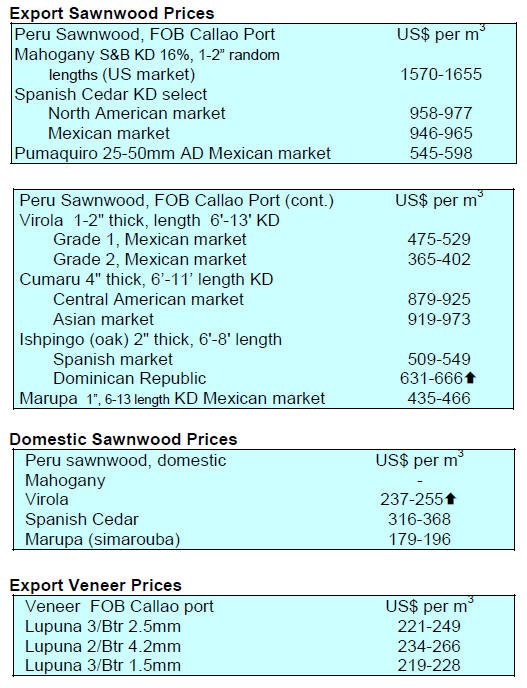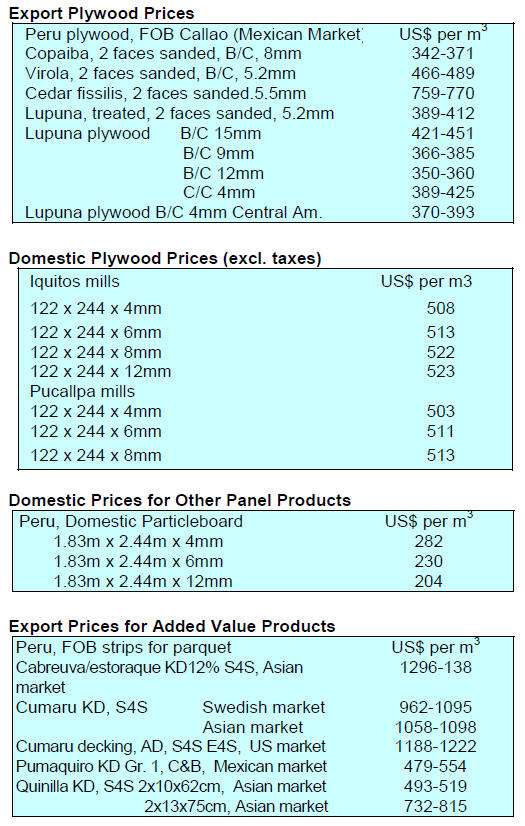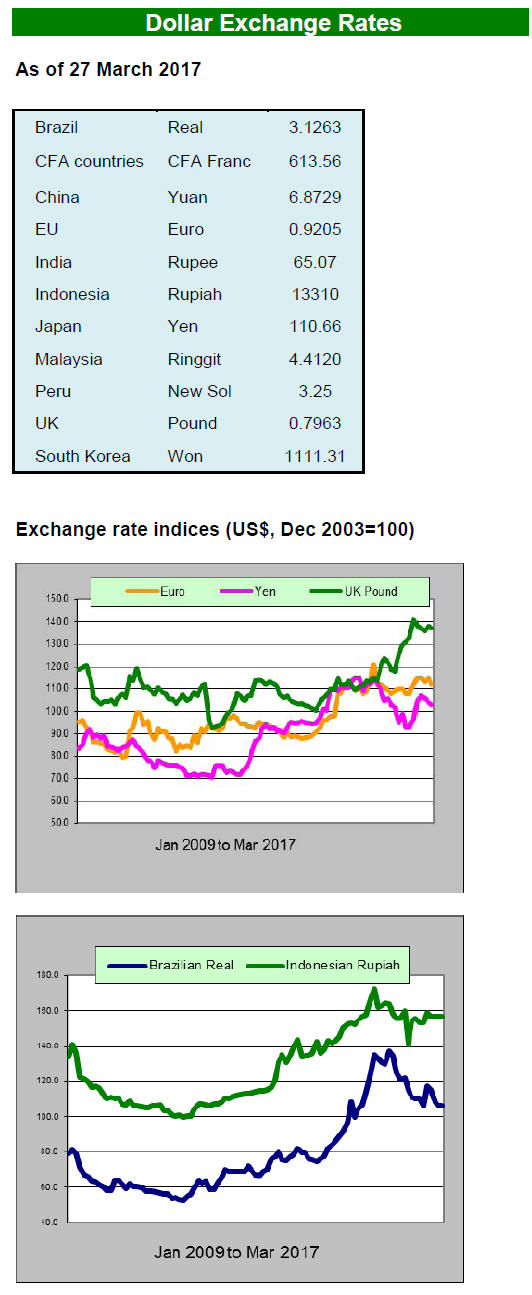2. GHANA
Kiln dry boule export surge
According to Timber Industry Development Division
(TIDD) report for December 2016, the year-on-year export
of kiln dried boules more than doubled.
For 2016 wood product exports totalled 396,991cu.m at a
value of Euro 224.98 million.
Compared to 2015 export volumes rose 8% and export
values rose almost 20%.
Of the nineteen wood products exported, air-dried
sawnwood, plywood, kindling, boules (KD) and curl
veneers registered significant increases in volumes.
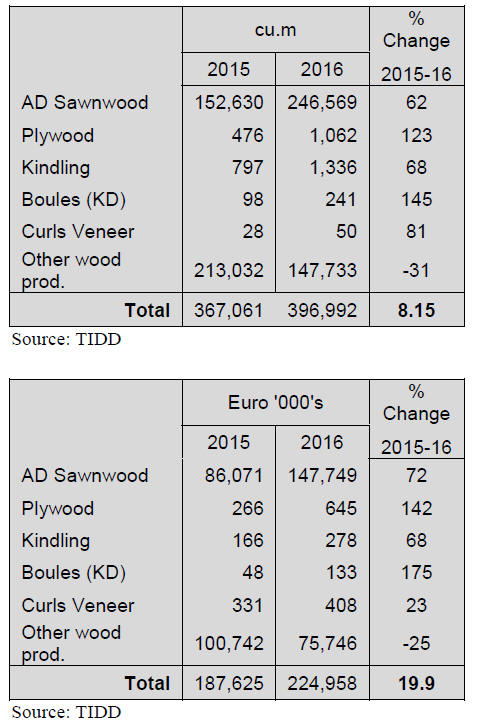
Asia continued to be the leading market for Ghana’s
wood
products, accounting for 73% of total export volumes in
2016 compared to 59% in 2015. There were declines in
exports to Europe (-4%), Regional African markets (-8%),
America (-2%) and there was a slight drop in export
volumes to markets in the Middle East.
Forestry Commission has new CEO
Mr. Kwadwo Owusu Afriyie has been appointed as the
new Chief Executive Officer of the Forestry Commission
of Ghana. Mr. Afriyie, a lawyer, replaces Mr. Samuel
Afari Dartey.
One of his first actions was to inaugurate a 15-member
strategic group that will lead efforts to promote investment
in forest plantations as a way of ensuring sustainable
production from Ghana’s forests.
The formation of the group known as the ‘Forest
Plantation Investment Forum’ (FPIF) stems from the
Ghana Forest Plantation Strategy report. The group,
headed by Professor Dan Ofori, is expected to promote the
interest of investors by influencing the necessary policy
and legal reforms that will lead in creating a more
enabling environment for investments in forest plantations.
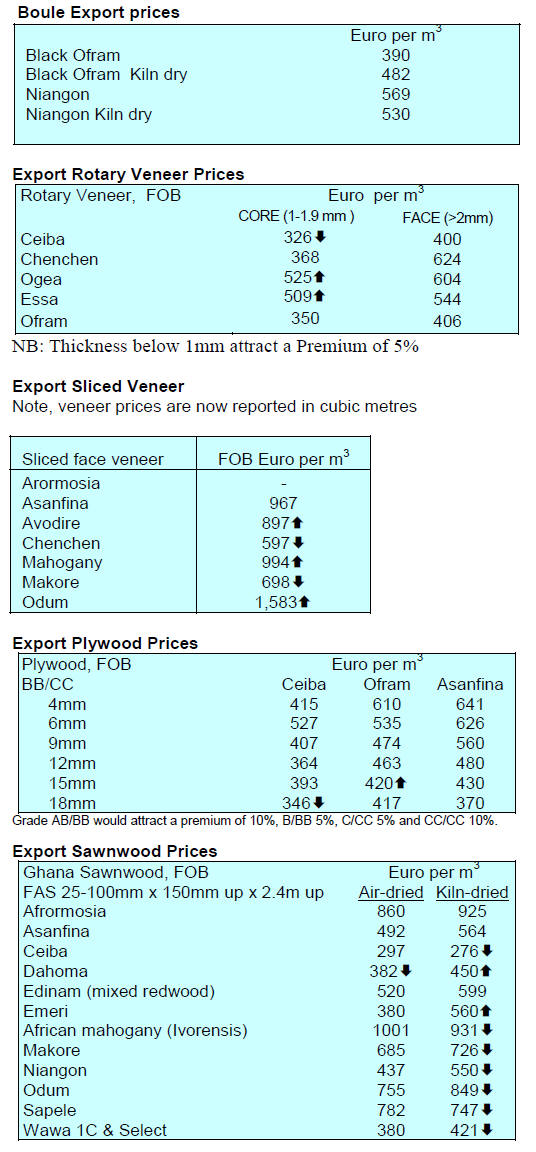
3.
SOUTH AFRICA
Strategy for sawmill sector must address
raw material
resources
The latest issue of Sawmilling South Africa has a press
release addressing the problems faced by the sawmilling
sector because of inadequate domestic timber resources.
“We all need to ensure that we nurture the sawmilling
sector as its growth has the ability to grow big
corporations, create jobs and boost the economy” said the
Executive Director of Sawmilling South Africa, Roy
Southey when speaking at a workshop to discuss the
development of a strategy for the sawmilling industry.
Southey added that the sawmilling industry can create
much needed jobs which can serve to benefit rural people.
The workshop heard that declining forest resources is one
major challenge that needs to be addressed by both
government and the private sector. Southey contended that
expansion of forestry, making better use of current
resources and looking beyond the borders of South Africa
could enliven investment and growth in the sawmilling
sector.
Eucalyptus planting seen as a good option
Southey proposed the exploration of eucalyptus as an
alternative resource to be developed pointing to the short
rotation of eucalyptus plantations.
In response the Director of Forestry Based Industries at the
Department of Trade and Industry, Ms. Tafadzwa
Nyanzunda, said that the Department was working with
the industry to develop a comprehensive wood processing
strategy that would assist in the recapitalisation of the
aging machinery as well as improve productivity in the
sector.
Nyanzunda highlighted that the importance of the
sawmilling industry to the South African economy cannot
be over emphasised. Therefore, it was paramount for the
industry to continue the work they had started with
government of developing the strategy of the sawmilling
industry.
Workshop participants agreed that resources for the
industry were a challenge and emphasised there was a
need for developing good working relationships forestry
research institutes and an urgent need for development of
a strategy to increase access to export markets as well as
promotion of wood culture in the domestic market.
See:
http://www.timber.co.za/news/article/sawmilling-sectorsresource-
shortages-need-urgent-attention
4.
MALAYSIA
Nurturing local talent for the furniture
industry
As part of its internship programme the Malaysia Timber
Industry Board (MTIB), in collaboration with the training
institute Politeknik Shah Alam (PSA) and the Muar
Furniture Association (MFA), began a programme to
encourage and nurture local talents for sustainable growth
in the furniture industry.
This pioneer programme has been introduced by MTIB to
help address the manpower shortage the furniture industry
faces and is part of a wider national initiative involving
government agencies, academic institutions, industries and
civil society to address labour development in the country.
The PSA students will be working at selected MFA
factories for six months. After completing their internship
the students may be offered jobs in the furniture industry
depending on their interests and aptitude.
Export Update
The MTIB has released 2016 export data. The table below
shows, for 2015 and 2016, the range of products produced
and the proportion exported by manufacturers in Peninsula
Malaysia, Sabah and Sarawak.
Shippers in Peninsula Malaysia dominate exports of
sawnwood, mouldings, particleboard, fibreboard, builders’
woodwork and furniture. On the other hand shippers in
Sarawak are strong in terms of exports of logs and
plywood and veneer.
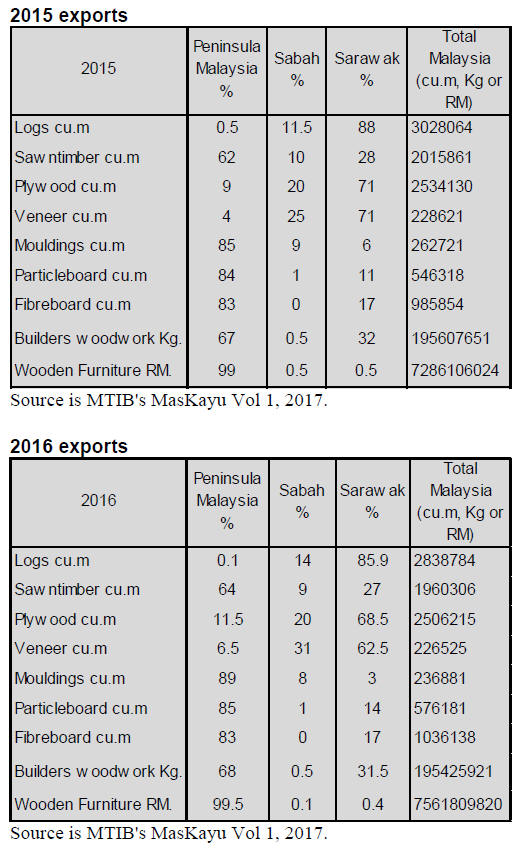
The challenge of tackling encroachments in Sabah
Illegal encroachment into forest reserves by local
communities is a common problem in many tropical
countries and authorities in the State of Sabah in Malaysia
have been trying to move illegal settlers from a forest
reserve.
The Director of Forestry in Sabah, Sam Mannan, said he
could remember this forest was once in pristine condition
but that between 1980-90 illegal settlements began to
appear. Around 2004 the Forestry Department offered
these settlers ‘occupation permits’ to regularise their
occupation of the land and ensure no further expansion
took place.
However, since this offer was conditional on there
being
no activities in, or use of, riparian or steep areas it was
rejected by the settlers. Having exhausted all efforts the
Forestry Department recently took drastic action to
remove the illegal settlements.
Drones gather evidence to tackle illegal logging in
Sarawak
The Sarawak Forest Department has gathered evidence to
solve many illegal logging cases thanks to its use of aerial
drones.
However, the Director of Forests, Sapuan Ahmad, is aware
that drones could only detect such cases once the damage
has been done and that efforts are needed to prevent illegal
activities in the forest.
For more see:
http://www.theborneopost.com/2017/03/17/forest-departmentsuse-
of-drones-solves-many-illegal-logging-cases/
Marketing in a borderless world
In a press release the Malaysian Timber Council has
announced that, as part of its 25th anniversary
celebrations, it will host an marketing seminar “Global
Timber Market Outlook and Export Opportunities for
Malaysian Timber Products and Furniture” on 18 April.
The aim is to update industry on the market outlook and
export opportunities for Malaysian wood products in
China, India, Europe, South Africa, the Philippines and the
USA and to offer participants the opportunity to share
ideas and experiences in trading in these markets.
For more see:
http://www.mtc.com.my/events-Seminars.php?id=100
Mid-March plywood export prices
Plywood traders in Sarawak reported February FOB
export prices as:
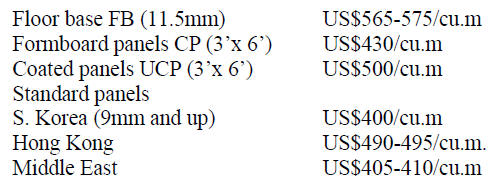
5. INDONESIA
Review VPA/FLEGT says furniture and craft
association Chairman
The Indonesian Furniture and Craft Association (HIMKI)
Chairman has urged the government to conduct a review
of the VPA/FLEGT Agreement with the EU because, he
says, it is undermining the efforts of association members
to increase exports.
To back this up he said exports by members of the
association had dropped 15-20% since the Agreement was
ratified.
The main problem he pointed out was that most of the
members of the association are SMEs and they cannot
cope with the numerous procedures and requirements to
satisfy the SVLK and the demands from overseas buyers.
This has given a competitive advantage to exporters in
neighbouring countries which do not have timber legality
verification systems like Indonesia.
In related news, Muhammad Hidjrah Saputra a board
member of HIMKI DPD Cirebon, has suggested that
legality verification of upstream producers should be
sufficient and asks why downstream manufacturers also
have to be certified if they utilise timber from certified
millers. He said the current system is adding unnecessary
costs and hindering export competitiveness.
See: http://merahputih.com/post/read/pengusaha-mebel-mintapemerintah-
cabut-svlk
SVLK increases the competitiveness of Indonesian
furniture
In sharp contrast to the statements from the Furniture and
Craft Association, the Director of Processing and
Marketing in the Ministry of Environment and Forests,
Rufi'ie, has said the national timber legality verification
system (SVLK) is a tool to increase the competitiveness of
Indonesian furniture and craft in the EU market. He said
the SVLK serves as the basis for demonstrating
Indonesian furniture and handicraft producers are meeting
the demands of the international market for verified legal
and sustainable wood products.
Rufi'ie quoted data from the ministry’s SVLK information
systems that show the export value of furniture and craft
products with V-legal (SVLK certified) documents
increased from US$635 million in 2015 to US$916 in
2016. However, analysts point out it is difficult to
determine how much of this increase is because of the
SVLK and how much is the result of an improved global
economic outlook.
See:
http://www.thejakartapost.com/news/2017/03/14/businesspeoplecredit-
svlk-for-improved-sales.html
Minister proposes tax relief for furniture exporters
Airlangga Hartarto, the Minister for Industry, has
indicated his ministry will approach the Ministry of
Finance to try and secure tax relief for furniture exporters.
This he revealed when speaking at the opening of the
Indonesia International Furniture Expo (IFEX).
The Minister expects timber exports will increase to
US$5 billion by 2020 because of firm demand for
Indonesian products in the United States, Japan and
Western Europe. He added that expansion of the furniture
and craft sector is vital for job creation as it is a labour
intensive sector.
http://www.thejakartapost.com/news/2017/03/14/businesspeoplecredit-
svlk-for-improved-sales.html
Forest land to be re-designated
Two Presidential Decrees related to agrarian reform are
being prepared in relation to redefining areas classified as
forests but occupied by communities.
It is understood that a legal basis for certifying that land in
forest areas that has been occupied by residents will be
provided. In the future, under the new legislation, the
status of the occupied land will be excluded from the area
considered forest area.
One problem that has emerged is that a large part of the
forest land in question is covered by commercial
plantation and managed by private corporations. A
decision on how to handle this issue is now being
considered.
In related news, the Indonesian President has confirmed
support for acknowledging customary forests in order to
promote and protect the rights of indigenous people in the
country. This was announced by the Minister of
Environment and Forestry, Siti Nurbaya Bakar, during the
opening of the fifth congress of the Indigenous People’s
Alliance. To-date the President has issued decrees
acknowledging the customary forests of nine indigenous
communities.
Opportunities in energy plantations
The Ministry of Environment and Forests is reviewing its
policy on the development of energy plantations for the
production of biofuel and biomass energy. Species being
considered include eucalyptus, albizia, calophyllum,
acacia, calliandra, and aleurites. The chairman of the
Association of Indonesian Forest Concessionaires (APHI)
has reported that many association members were ready to
develop energy plantations.
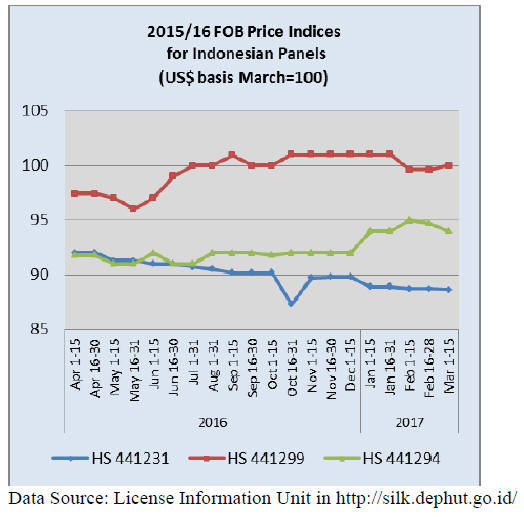
6. MYANMAR
Danish authorities warn teak importers
A press release from NepCon, a Danish non-profit
organisation, says the Danish Competent Authority asked
seven local companies to strengthen their due diligence
systems if they wish to continue to market Myanmar teak
in the EU.
This, once again, raises questions on whether it is
currently possible for importers of timber from Myanmar
to satisfy the EU Timber Regulation.
NepCon says Danish authorities audited some companies
that had imported teak from Myanmar after being alerted
to allegations by the Environmental Investigation Agency.
The Danish authorities concluded that the system in place
in all seven companies was not robust enough to
demonstrate a negligible risk of illegality.
The problem, says NepCon, is that the authorities in
Myanmar are not allowing importers in the EU access to
information on the origin of the timber and that they do
not have systems in place to adequately assess the risk that
illegal timber is entering the supply chain.
This allegation has been raised before but during the
February 2017 timber legality assessment system ‘Gap
Assessment Workshop’ involving the EU and various
stakeholders, representatives of the Myanma Timber
Enterprise (MTE) denied this saying they had not been
approached for information, adding that the Forestry
Department is the final authority to be approached.
Competent Authorities in Belgium, Italy, Netherlands,
Spain and the UK are also investigating possible breaches
of the EU Timber Regulation as a result of the import of
teak from Myanmar. These cases were also brought to
them by the Environmental Investigation Agency.
In an apparent reaction to the Danish ruling, the Myanmar
Ministry of Natural Resources and Environmental
Conservation released a statement in which they
acknowledged the challenges in tracing timber back to the
forest because, at present, their system is primarily
designed for the recording statistics.
For more see:
http://www.nepcon.org/denmark-myanmar
UK TTF warns members do not import Myanmar teak
In response to the actions taken in Sweden and Denmark
against importers of Myanmar teak, David Hopkins,
Managing Director of the UK Timber Trade Federation,
writes in the March TTF Newsletter “If the EUTR is to be
successfully implemented then there must be a level
playing field in Europe. This means we should respect the
decisions made in Sweden and Denmark and accept them
across the continent.”
The TTF says “Since the authorities in Myanmar are,
as
yet, unable to offer sufficient evidence of legality TTF
members should cease to trade in teak sourced from
Myanmar.”
See http://www.ttf.co.uk/article/the-legality-of-teak-frommyanmar-
519.aspx
Draft regulations on traceability tabled for discussion
The Secretary of the Myanmar Forest Certification
Committee (MFCC), Barber Cho, pointed out that by
coincidence and some days prior to the Danish ruling, the
authorities in Myanmar had prepared a draft statement on
tracking proposals.
Cho has revealed that the MFCC submitted
recommendations to the government on strengthening
traceability through independent third party verification,
independent monitoring and the creation of a Focal Group
for Communication to deal with enquiries from
international traders.
Cho reports that the government has agreed in principle to
the MTCC recommendations and that now the details of
the system will be worked out as quickly as possible. But
he says there are serious challenges as exporters need
quick solutions to maintain their businesses while civil
society groups seek wider reforms which will require
careful consideration and debate.
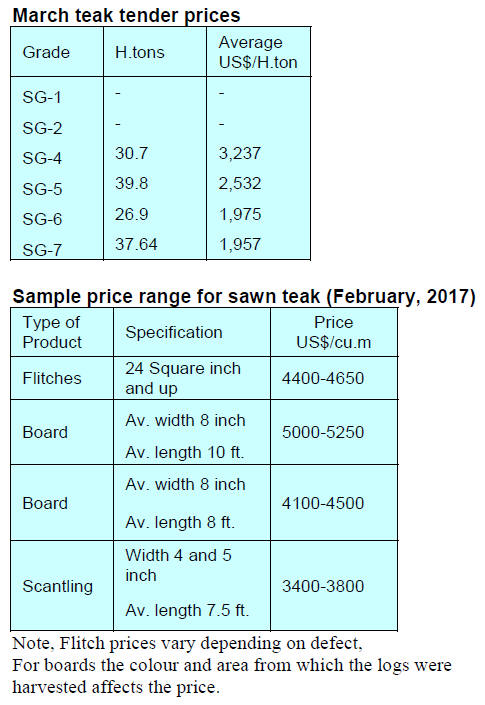
7. INDIA
India's new tax system to be launched in
July
The long awaited implementation of the goods and
services tax (GST) which will standardise tax levels across
the nation is expected to come into force in July if the
government succeeds with the final pieces of legislation,
however, many are questioning if companies are ready.
A recently reported survey conducted by Edelweiss
analysts suggests that most large companies have
management systems in place.
The problem is that many of the thousands of small
stockists and traders have been deterred by the costs
involved in complying with the new system. As mentioned
in earlier reports, many of the small scale plywood
stockists and traders operate below the current tax radar
and survive on razor thin profit margins.
In related news, exporters have been reassured that they
would continue to benefit from duty refunds even after the
new tax system is introduced. The GST Council has
included a provision in the legislation enabling duty
drawback on the value of products manufactured locally
for export.
See:
https://www.edelresearch.com/home.aspx
Inflation at 30 month high
India’s February consumer price inflation (CPI) rose
3.65% from the reported 3.17% in January mainly because
food prices have started to rise.
Data from the Office of the Economic Adviser in the
Ministry of Commerce and Industry says inflation jumped
to a 30 month high of 6.55% in February from 5.25% in
January.
Timber and plywood price indices slide at year end
The OEA also reports Wholesale Price Indices for a
variety of wood products. The Wholesale Price Indices for
Wood products and Plywood are shown below.
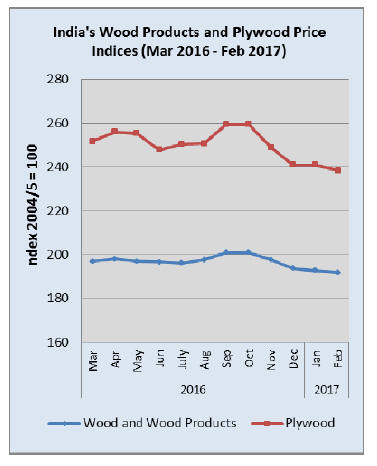
Central India teak auction
The latest auctions were held at Forestry Depots in
Timarni, Khilrkya, Ashapur and Narmada Nagar in
Madhya Pradesh. Analysts say teak these from areas come
mostly in 2 to 5 metre lengths and mostly of a girth 120
cm. and below. The logs from these areas tend to be
cylindrical and straight and the wood is of a golden colour
with black stripes.
Around 3,000 cubic metres of teak logs were sold and
additional stocks have arrived so new auctions will be
scheduled. The buyers at the latest auction were mostly
from local mills with some having travelled from Gujarat
and Maharashtra.
Prices at the latest sale are shown below.
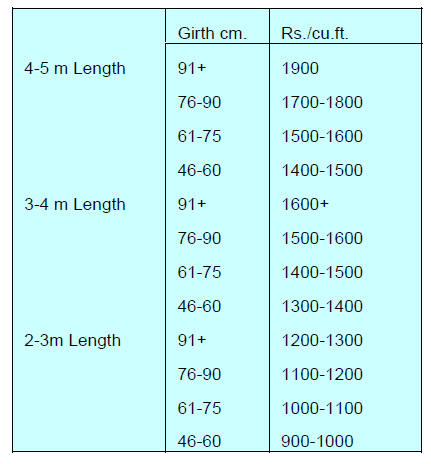
Farm forests encouraged to boost industrial raw
material supply
The Northern India, Haryana State Forest Department has
decided to issue new licenses for wood-based industries
and will do so using a newly developed ‘e-citizen service’.
The aim is to encourage farm forestry to help implement
the Haryana Forest Policy.
The State Forestry Department has over 18,000 hectares of
plantations and thousands of seedlings have been
distributed or sold to farmers.
Imports of plantation teak slow on quality concerns
Analysts report that the pace of imports of plantation teak
have slowed due to the declining quality of imported logs
which are derived mainly from plantation thinnings.
Because of this millers have turned to domestic sources in
order to satisfy both domestic and international demand.
Traders lament the poor quality of currently available logs
saying now would be a good time to raise import levels
because the rupee has strengthened making land costs
cheaper.
Progress on the phytosanitary issue is still under
consideration by Indian authorities who are coordinating
with authorities in exporting countries.
When an alternative to methyl bromide treatment is
approved this will offer importers with more options for
sourcing logs.
It is reported that consumer demand is steady and C&F
prices for imported teak are holding firm.
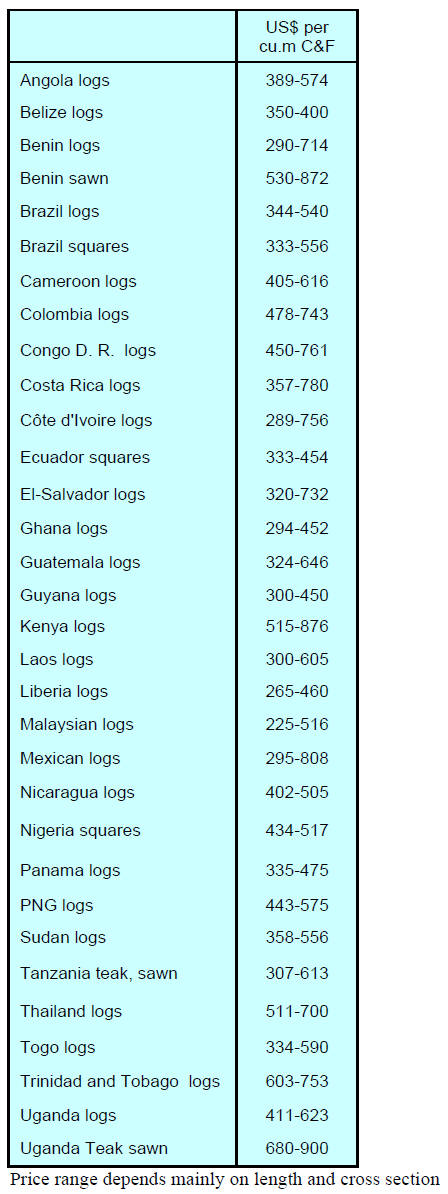
Sawnwood prices
Prices for sawnwood milled from imported logs remain
unchanged as shown below.
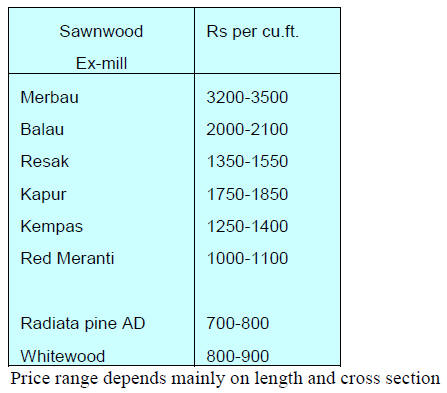
Prices for Myanmar teak
Current prices remain as reported two weeks ago but
traders anticipate a price rise when Myanmar’s export duty
comes into force.
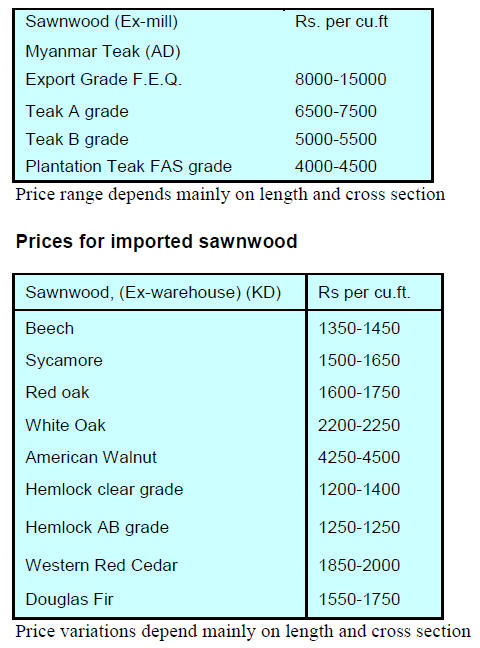
Still no opportunity to lift plywood prices
Plywood manufacturers continue to struggle with
declining margins as production costs rise. The only
opportunity manufacturers will have to lift prices in the
short term will be when the goods and services tax is
introduced as this will likely eliminate many of the
‘informal’ manufacturers thus creating a shortage of
plywood in the market.
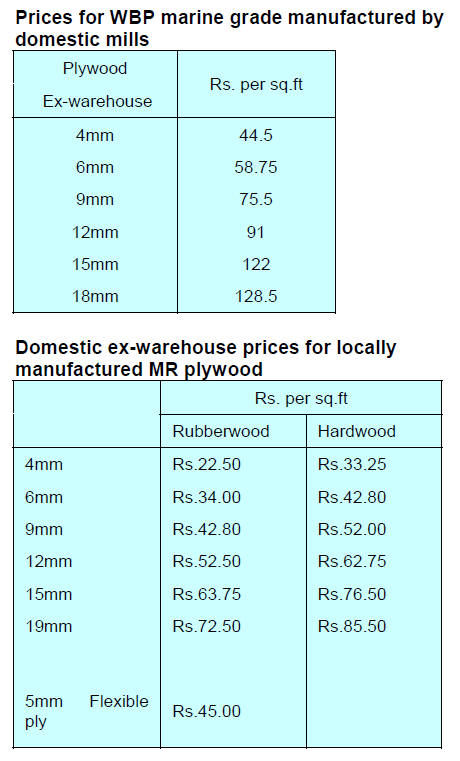
8. BRAZIL
Export update
In February 2017 Brazilian exports of wood products
(except pulp and paper) increased 8.3% in value compared
to February 2016, from US$177.7 million to US$192.3
million.
The value of pine sawnwood exports increased 12.4%
between February 2016 (US$27.4 million) and February
2017 (US$30.8 million) and in terms of volume, exports
increased 8.4% over the same period, from 140,900 cu.m
to 152,700 cu.m.
Tropical sawnwood exports also rose (13.5%) from 27,400
cu.m in February 2016 to 31,100 cu.m in February 2017
and with export values rising just over 16% (US$11.8
million to US$13.7 million over the same period) some
price increases have been achieved.
February 2017 pine plywood exports increased 6.7% in
value year on year, from US$34.4 million to US$36.7
million but the corresponding increase in the volume of
exports was only around 4.0% over the same period
(132,800 cu.m to 138,100 cu.m).
As for tropical plywood, exports decreased significantly in
volume and in value, from 11,000 cu.m (US$4.3 million)
in February 2016 to 9,800 cu.m (US$3.6 million) in
February 2017.
In a turn-around from recent growth, Brazil’s
wooden
furniture exports declined from US$34 million in February
2016 to just US$33 million in February this year.
Exporters on the alert as the currency appreciates and
production costs rise
The Brazilian currency has appreciated sharply against the
US dollar over the past 12 months which is raising alarm
bells amongst wood product exporters.
According to the Brazilian Association of Mechanically
Processed Timber Industry (ABIMCI) the Brazilian
currency was down almost 23% on the US dollar as of
February 2016 but has since strengthened steadily. Against
a back-drop of rising production costs and the appreciating
currency Brazilian exporters are bracing for tough times
ahead.
Pine plywood manufacturers exported 1,730,470 cu.m in
2016, the highest volume in the past 10 years. This
represented a 16% increase compared to the volume
shipped in 2015.
According to ABIMCI exports expanded as domestic
demand fell due to paralysis in the economy. While
welcoming the expanded demand in the US and EU the
plywood industry will be generating more profits when the
domestic market also comes back to life.
Paranaguá container terminal breaks record for timber
shipments
The Paranaguá Container Terminal (TCP), in Paraná State
saw timber exports at 2,311 containers in December 2015
beat all past records.
According to TCP, growth in wood products handling at
the port was the result of the surge in exports as
manufacturers turned to exports in the face of weak
domestic demand. The weaker currency and enhanced
services at the port delivered startling growth in the cargo
handled.
Port services were improved through investment in
equipment and modernisation of the terminal with the
support of more than 20 timber carriers in the State which
offered competitive services.
For 2017, analysts expect the growth in export shipments
to moderate due to the appreciation of the Real and the
expected improvement in domestic consumption.
Strengthening forest economics in Rondônia
Forest concessions for sustainable utilisation was the
theme discussed at a forestry seminar hosted by the
Federation of Rondônia State Industries (FIERO), in
partnership with the National Confederation of Industry
(CNI), State Secretariat for Environmental Development
(SEDAM), Brazilian Institute of Environment and
Renewable Resources (IBAMA) and Ministry of
Agriculture, Livestock and Supply (MAPA-RO).
The Jamari National Forest, located in the municipalities
of Itapuã do Oeste, Cujubim and Candeias do Jamari, was
cited as a successful example of sustainable use of natural
resources in the area. According to FIERO it is desirable
to conduct an inventory of the region's forest reserves to
identify the economic potential that can be sustainably
utilised for timber as well as resins, fibres and essences
used in the pharmaceutical and cosmetic industries.
A past FIERO survey has shown that the State´s forest
economy supports more than 30,000 jobs and contributes
substantially to the State’s GDP.
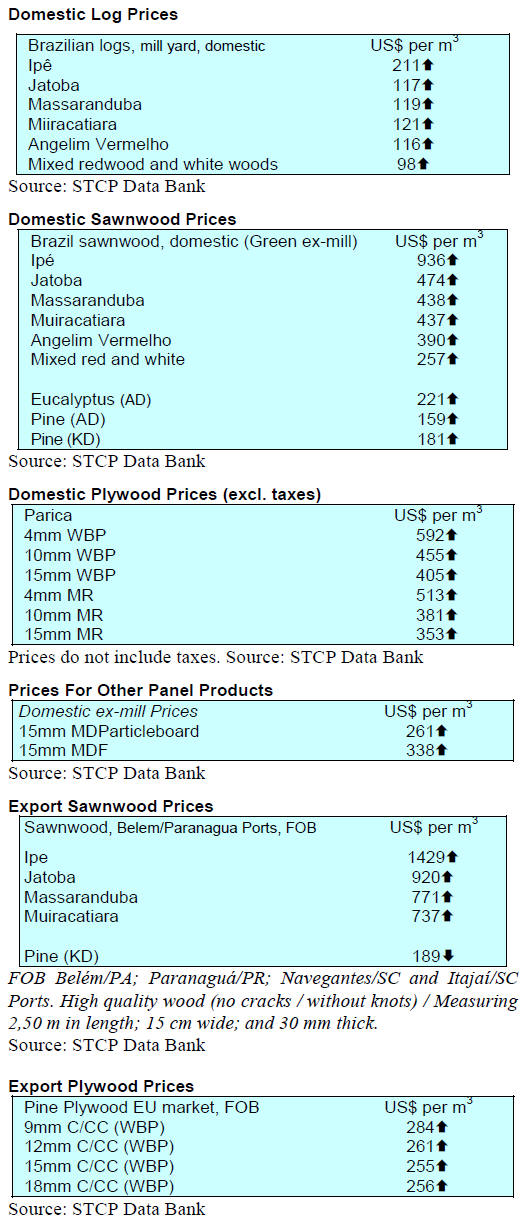

9.
PERU
Plan to reforest 3 million hectares by
2020
The Minister of Agriculture and Irrigation (Minagri), José
Manuel Hernández, announced that by 2020 the National
Forestry and Wildlife Service (Serfor), with the support of
other bodies in the Ministry such as Agrorural (Programa
de Desarrollo Productivo Agrario Rural) and INIA
(Instituto Nacional de Innovación Agraria), aims to
reforestation of 3.2 million hectares of degraded land.
The Minister said reforestation of degraded soils is one of
the foundations of the government’s agrarian policy.
Several regional pilot programmes are underway in
Amazonas, Apurímac, San Martín and Piura. Forest
plantations are being established on degraded areas in
Áncash, Huánuco, Junín, Pasco and Ucayal.
It has been pointed out that in order to achieve the 3.2
million hectare goal private capital must beattracted.
Tracking will improve competitiveness
The National Forest and Wildlife Service (Serfor) has
rolled out its proposals for a system to monitor timber
flows that can form the basis of a means for verifying the
legal origin of wood products. The National Forestry and
Wildlife Information System of Peru (SNIFFS) has been
tested in the Loreto-Ucayali-Huánuco-Lima Amazon
corridor.
The Deputy Minister of Agricultural Policies in the
Ministry of Agriculture and Irrigation, Benjamín
Quijandría, said the new system provides for traceability
and verification of the legal along the supply chain and
should give a boost to exports.
Reactivating timber export trade
At the third meeting of the Executive Board for Forest
Development the discussion focused on promoting the
forestry sector and exports of Peruvian wood products, the
main challenges for the sector. Recent development of a
tracking system for wood product flows was seen as a
major step to improve export opportunities.
A further issue raised by the private sector was the method
by which regional governments process and assess
management plans as there is a concern that plans are not
being prepared in accordance with regulations.
Another point raised at the third session of the Executive
Board for Forest Development was how to standardise
measurement of standing and harvested logs which
currently varies from region to region.
Promoting sustainable supply chains for Zero
Deforestation
The Executive Director of the Forest and Wildlife Service
(SERFOR) of the Ministry of Agriculture and Irrigation
recently opened an international seminar themed
"Managing the Risks of Deforestation, Promoting
Sustainable Supply Chains in Latin America to China and
Europe".
This seminar was jointly sponsored by the University of
ESAN, the Peruvian Eco-development Society, Driving
Sustainable Economies and the Norwegian Agency for
Development.
This event was attended by experts from Brazil, the United
States and Peru to exchange experiences of promotion and
articulation between suppliers and corporations buying
commodities in order to add value to supply chains.
The seminar brought together representatives of industry,
exporter associations, local communities, NGOs and
international cooperation agencies in order to exchange
ideas on zero deforestation, zero carbon emission as well
as social and environmental projects. This activity was in
part fulfilment of the national commitments in relation to
climate change agreed with Germany and Norway.
